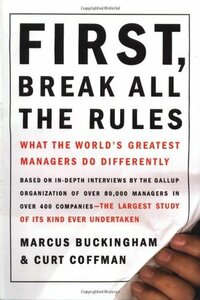Take a photo of a barcode or cover
94 reviews for:
First, Break All the Rules: What the World's Greatest Managers Do Differently
Curt Coffman, Marcus Buckingham
94 reviews for:
First, Break All the Rules: What the World's Greatest Managers Do Differently
Curt Coffman, Marcus Buckingham
Finished this one up today, and not a moment too soon given the paper on it that is due tomorrow.
There is a common theme that I have found in all of my academic readings and this one subscribes to it hook, line, and sinker. This book is not a how-to book for the aspiring manager. It is merely a boost to the aspiring manager's confidence when he/she wants to try something unconventional.
The Gallup poll certainly undertook an aggressive research project. Some may find fault in their research, but given the general theme of the book, any fault in the research is a bit of a moot point.
The book is well-written - easy to understand and full of ideas to implement. As a word of caution, one should adopt this as their one manual. It should be a reference on your shelf.
There is a common theme that I have found in all of my academic readings and this one subscribes to it hook, line, and sinker. This book is not a how-to book for the aspiring manager. It is merely a boost to the aspiring manager's confidence when he/she wants to try something unconventional.
The Gallup poll certainly undertook an aggressive research project. Some may find fault in their research, but given the general theme of the book, any fault in the research is a bit of a moot point.
The book is well-written - easy to understand and full of ideas to implement. As a word of caution, one should adopt this as their one manual. It should be a reference on your shelf.
Simple straight forward advice for how to maybe succeed as a manager. Most of it seems common sense but its always good to have the common sense reinforced
An excellent management book. Lots of good questions in it for managers to ask themselves, their employees, their prospective employees, and their own superiors. Dinged down one star purely because it's twenty years old and some of its anecdotes are showing their age. Still a great read.
I listened to this one on CD in my car, and enjoyed how he debunks most of the "conventional thinking" around management and supervising other employees. Some of the information may have been easier to understand in print form...hearing some one read a chart or graph isn't always effective, but overall, it's full of food for thought for anyone in charge of overseeing other employees.
There are some great points in this book. However, it was clearly outdated data that was being analyzed and meant for managing Boomers and no one younger.
I found this book to be dated and if it wants to be relevant, they should do an updated version with modern examples. It was also really repetitive and I didn't think it was enough actual content to fill a whole book. Would have been better as a more concise online piece.
Cathy Allen A few years back, in a fit of misguided patriotism, I took a J.O.B. in a government agency with a mission to help people who would otherwise struggle to get by. Two weeks in, I realized I was reporting to a supervisor who knew nothing about being a supervisor. Worse, one of her colleagues decided to "help" by inserting himself into everything our unit did. I had two bosses, and I had no idea how to make either of them happy.
Then one day, I spotted this book on Boss #2's shelf. I'd already enjoyed others by Marcus Buckingham, and I knew that one way to connect with someone is to read something they recommend. So I asked to borrow the book. He agreed, but was clearly annoyed. He didn't like anything about me and he made sure I knew it.
What a belly laugh I had when I discovered that Buckingham had written a how-to manual for being a good manager! Treat people the way they want to be treated... define outcomes for your staff... focus on their strengths...match the people to the work... all the things neither of these two supervisors were doing. Of the 12 questions that predict employee satisfaction and performance, my peers and I could answer only one or two positively. LOL.
I read the book in a few days and returned it to Boss #2 right away. "Here's your book back. Thanks for letting me borrow it. Have you read it?"
"Of course I've read it!" he practically snapped. (God, Cathy, you are so stupid.) End of discussion.
So, here is the thing about books: they are excellent tools for learning. If someone wants to change and grow and gain a new skill, there is probably a darn good book about whatever they want to learn. But books are not magic bullets. They can't make people change or improve their skills. If they could, I might still be in that job. As it was, I lasted only a few months before happily returning to consulting, where I still use the book to help clients who want to learn how to be better supervisors.
Then one day, I spotted this book on Boss #2's shelf. I'd already enjoyed others by Marcus Buckingham, and I knew that one way to connect with someone is to read something they recommend. So I asked to borrow the book. He agreed, but was clearly annoyed. He didn't like anything about me and he made sure I knew it.
What a belly laugh I had when I discovered that Buckingham had written a how-to manual for being a good manager! Treat people the way they want to be treated... define outcomes for your staff... focus on their strengths...match the people to the work... all the things neither of these two supervisors were doing. Of the 12 questions that predict employee satisfaction and performance, my peers and I could answer only one or two positively. LOL.
I read the book in a few days and returned it to Boss #2 right away. "Here's your book back. Thanks for letting me borrow it. Have you read it?"
"Of course I've read it!" he practically snapped. (God, Cathy, you are so stupid.) End of discussion.
So, here is the thing about books: they are excellent tools for learning. If someone wants to change and grow and gain a new skill, there is probably a darn good book about whatever they want to learn. But books are not magic bullets. They can't make people change or improve their skills. If they could, I might still be in that job. As it was, I lasted only a few months before happily returning to consulting, where I still use the book to help clients who want to learn how to be better supervisors.
This is truly a fantastic book, and one of the better business/leadership books I've read. I love its sheer practicality!
Sure, it gets in the weeds sometimes with #allthedata (and I defo love me as much data as possible, it just reads a bit dry at times), but man ... I'd love to see more companies implement the strategies included here.
I also love that my current boss exemplifies many of the qualities Buckingham uses to describe a "great manager." :)
Sure, it gets in the weeds sometimes with #allthedata (and I defo love me as much data as possible, it just reads a bit dry at times), but man ... I'd love to see more companies implement the strategies included here.
I also love that my current boss exemplifies many of the qualities Buckingham uses to describe a "great manager." :)
I like research based advice, and this book delivers that based on a scale that is unlikely to ever be surpassed; the number of organizations that Gallup had access to is sort of mind boggling.
However, the book is from 1999 and it fails to address at least two issues that recent research has shown as critical - diversity and psychological safety. In fact, some of its strongest advice seems to fly in the face of that recent research.
However, the book is from 1999 and it fails to address at least two issues that recent research has shown as critical - diversity and psychological safety. In fact, some of its strongest advice seems to fly in the face of that recent research.




